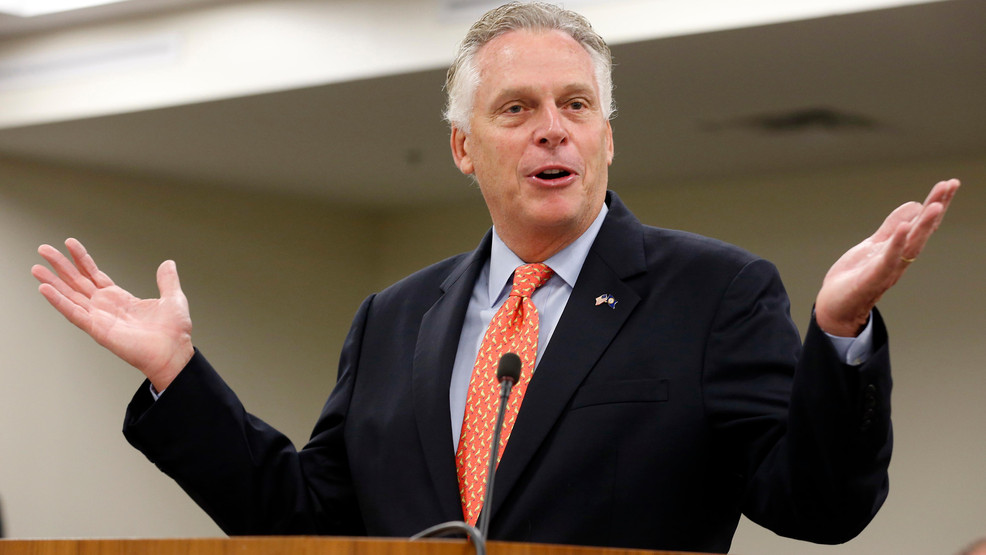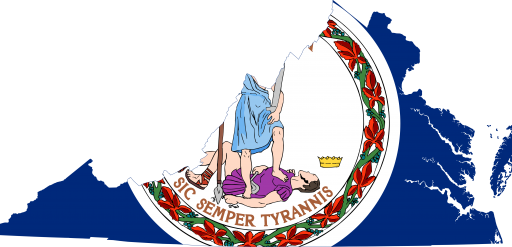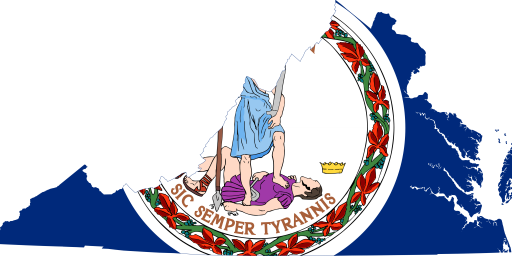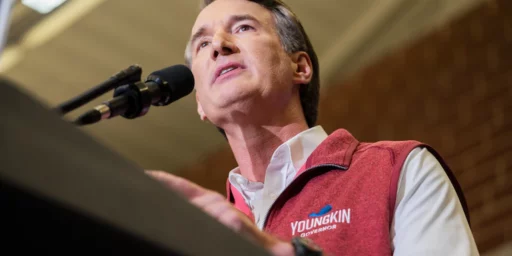Terry McAuliffe Running for Virginia Governor
The popular former governor wants another crack at it.

The most recent former governor, precluded from running for a second consecutive term by an archaic law, is the odds-on favorite to get his old job back.
WaPo (“Terry McAuliffe to seek a second term as Virginia governor“):
Democrat Terry McAuliffe, who mixed business-friendly politics with liberal social policies over four hard-charging years as Virginia governor, will announce Wednesday that he wants his old job back.
McAuliffe, 63, is scheduled to formally kick off his bid for a second term Wednesday morning in Richmond, according to four people with knowledge of his plans who spoke on the condition of anonymity because they were not authorized to discuss them.
A win would make McAuliffe only the second governor since the Civil War to make a comeback in Virginia, the lone state to bar its chief executive from serving back-to-back terms.
McAuliffe left office in January 2018 with positive ratings, low unemployment and a record $20 billion in promised business investment. With a high profile and a professional background as a record-smashing fundraiser for Bill and Hillary Clinton, he enters a crowded Democratic primary widely seen as the odds-on favorite.
That’s an understatement. He would be running against a field of nobodies:
McAuliffe, who is White, also faces some tricky racial and gender politics, given that the three Democrats already seeking the nomination are Black and two are women. They are Lt. Gov. Justin Fairfax, Del. Jennifer D. Carroll Foy (Prince William) and state Sen. Jennifer L. McClellan (Richmond).
While I don’t pay nearly as close to local politics as I do national and international, I’ve lived in Virginia 18 years now and have heard of only one of them, Fairfax, and that only because he was mired in scandal a while back.
The Commonwealth was decidedly Republican when I moved here but is increasingly blue. And the GOP isn’t putting up any world-beaters:
On the Republican side, there are two declared candidates: Del. Kirk Cox (Colonial Heights), the former speaker of the House of Delegates, and state Sen. Amanda F. Chase (Chesterfield), who said Saturday she will run as an independent after the state GOP voted to choose its nominee at a convention instead of in a statewide primary.
Five other Republicans are actively exploring bids: outgoing Rep. Denver Riggleman; Northern Virginia businessman Pete Snyder; former Carlyle Group co-chief executive Glenn Youngkin; state Sen. Emmett W. Hanger Jr. (Augusta); and Charles “Bill” Carrico, a retired state trooper and former state senator from Grayson County, in the state’s far southwest.
For much of its history my old home state of Alabama had the same rule. It infamously led to George Wallace running his wife, Lurleen, as a stalking horse in the 1966 election. It worked, although she sadly died fourteen months into her tenure. The law was changed in 1968 to allow serving two consecutive terms, which Wallace did from 1971-1979. He won a fourth term in 1983.
The Virginia legislature has considered changing the law multiple times, including early last year, but has not done so. Why? According to one explainer,
According to Brent Tarter, a retired historian with the Library of Virginia in Richmond, the ban has roots in the commonwealth’s founding in the wake of the American Revolution.
“It dates back to 1776,” he says. “There was a legacy of resentment of royal authority at the time of the American Revolution, and the way royal authority was exercised was through the office of the governor.”
Virginia’s founding constitution settled that resentment by creating a relatively weak governor’s office, and leaving the responsibility of choosing a governor to the General Assembly. From 1776 to 1830, governors served one-year terms, and could serve three terms in a row. In 1830, the General Assembly extended the term in office to three years, but without any chance for re-election.
It wasn’t until 1851 that Virginians could actually elect their governor directly. By then, the constitution called for a single four-year term with no re-election, and that’s how it’s been since. It’s a ban that only applies to the governor, and even though a governor can run again for a non-consecutive second term, only one has actually successfully done so since the Civil War. (For your trivia night: Mills Godwin was elected as a Democrat in 1965 and then as a Republican in 1973.)
And that’s how State Senator Chap Petersen (D-Fairfax City) thinks it should remain.
“Our system was good enough for Thomas Jefferson, Patrick Henry and a lot of the Founding Fathers, and that’s what the system is,” he says.
Petersen argues that in Virginia, the institutional knowledge of the government resides within the legislature, and that the one-term limit serves as an important check on executive power:
“We have governors that come in for four years. They have a large amount control: they can appoint members of boards of commissions; they have a line-item veto, they can refuse or decide to spend money; they can name their own executives agencies. They have a tremendous amount of control as an executive, and the way we temper that is that we limit them to one term.”
Petersen also fears that if governors are allowed a second consecutive term, the next possible change would be a full-time legislature, not the part-time citizen legislature Virginia currently has.
But even with all the power governors do have, fellow State Senator Adam Ebbin (D-Alexandria) still thinks that they should be able to run for re-election, no matter how long the ban has been in place. He says Virginia’s future shouldn’t be governed by its past.
A novel concept.
Regardless, the policy means people are constantly jockeying for the job, which tends to be seen as a stepping stone to the Senate. But Mark Warner and Tim Kaine, both Democrats, are young and popular, meaning McAuliffe has nowhere else to go.
It’s a silly anachronism. And undemocratic. Then again, so is the fact that elections for state and local officers are in off-off years when turnout is the lowest. There is, so far as I can tell, no momentum for changing that.




Make Virginia governors Yanks again!
@Kylopod: The DC suburbs and exurbs of Northern Virginia have increasingly dominated the Commonwealth. He moved here during the Carter administration and, unlike Alabama, that’s long enough to be considered “from here.”
Ugh.
@Steven L. Taylor:
Oh, yes.
Taking a page from Penn & Teller, think of what medical science was good enough for the Founding Fathers. Not to mention sailing ships with minimal sanitary facilities were good enough for them. For that matter, they got along perfectly well without flush toilets, too, or toilet paper.
States can have odd, nonsensical approaches to governing, here in Cow Hampshire it is (among other oddities) it is the gubernatorial term is 2 years. That may have made sense in the post colonial era, but today is a hindrance to efficient administration. And not to forget the state HoR is 400 members for a state w/1.2M residents. I guess the rational is to have each Rep be closer to the community, but I’d offer that fewer than 1 in a 100 residents could name their state rep, even among political junkies.
Hey, back in the Stone Age I helped my fellow Virginians elect L. Douglas Wilder as gov. He is a Democrat!
But yeah, McCauliffe looks very solid
@Sleeping Dog: HoR of 400 members in a state as geographically small as NH? How’s the gerrymandering? Even in Texas we continually get stories of how someone is caught campaigning in the wrong district because of the block by block gerrymandering.
@Scott:
It gets weirder. There are 204 legislative districts of varying size, but they are multi member based on population with approximately 3300 residents per district. When I went to the polls last month, the ballot instructed me to vote for up to 6 state reps.
Campaigning in the wrong district happens here as well and in some cases it is intentional. It is allowable to place lawn signs on public property as long as they are removed w/in two days of the election, so at major intersections and along traffic arteries, you’ll see signs for candidates from several districts. The multi member district structure reduces the episodes of wrong district campaigning.
In contrast the NH senate is only 24 members standing for election every 4 years.
Then there is the governor’s council, a colonial era holdover intended to advise the Gov, appointed by the King, as to the local, formal and informal power structure.
Everything old is new again. I think the electorate might appreciate understated boring politicians who made things work reasonably well.